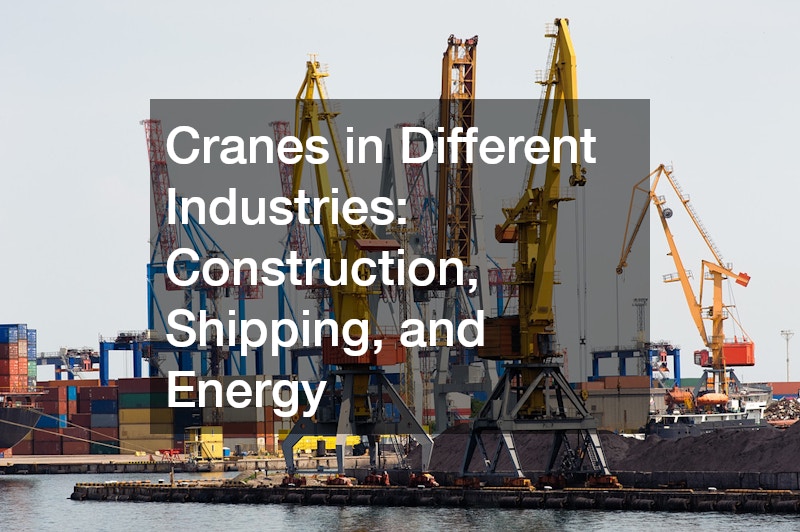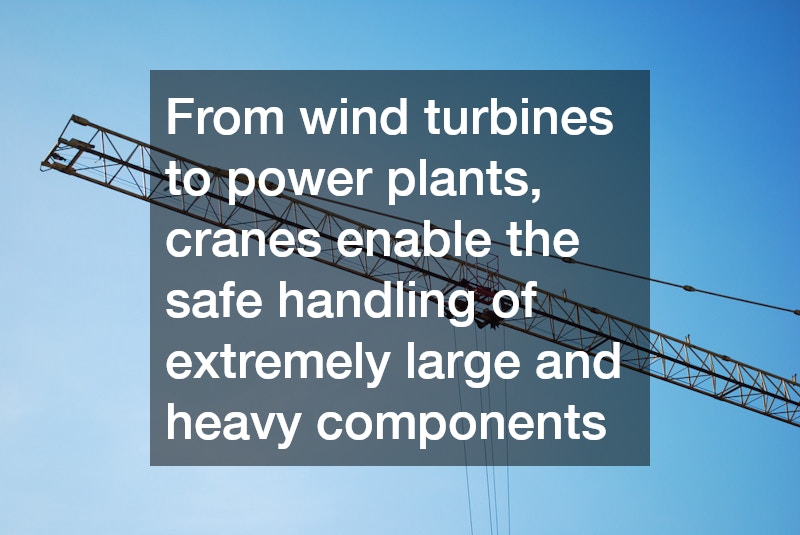
Highlights:
-
Cranes are vital across construction, shipping, and energy industries.
-
Different crane types (tower, mobile, crawler, rough terrain) serve specialized purposes.
-
A crane company with a wide variety of cranes ensures the right equipment for every project.
-
Safety and operator training are critical for efficient crane operations.
-
Specialized cranes improve efficiency in ports, wind farms, and high-rise construction.
-
Partnering with an experienced crane provider reduces downtime and project delays.
-
Diverse crane fleets allow businesses to handle complex, heavy-lifting tasks safely.

Cranes are essential machines that power many industries around the globe. Whether lifting heavy materials on a construction site, loading cargo at a port, or installing components at a wind farm, cranes provide unmatched versatility and efficiency. In this article, we explore the role of cranes in three major industries—construction, shipping, and energy—and explain why having a broad selection of crane types is crucial for operational success.
The Role of Cranes in Construction
Construction projects are complex, involving multiple tasks, equipment, and safety requirements. Cranes play a pivotal role in modern construction, enabling teams to move heavy materials efficiently and safely.
Common Types of Construction Cranes
A crane company with a wide variety of cranes often provides different models suited for construction projects of all sizes. Key types include:
-
Tower Cranes: Ideal for high-rise buildings, tower cranes offer impressive height and lifting capacity. They are commonly fixed to the ground and can lift steel beams, concrete panels, and other construction materials to upper floors.
-
Mobile Cranes: These cranes are mounted on wheels or tracks, making them highly versatile for projects that require frequent relocation. They can handle medium to heavy loads and are suitable for smaller construction sites where flexibility is key.
-
Crawler Cranes: Equipped with tracks, crawler cranes can operate on soft or uneven ground without stabilizing pads. Their superior lifting capacity makes them suitable for heavy-duty tasks such as bridge construction or large-scale infrastructure projects.
-
Rough Terrain Cranes: These are specially designed to navigate off-road construction sites. Their robust tires and adaptable chassis allow for safe operation in challenging terrains like dirt, mud, or gravel.
Applications in Construction
Cranes in construction are utilized for:
-
Lifting steel beams for structural frameworks
-
Hoisting concrete panels or precast components
-
Installing HVAC units and heavy machinery on rooftops
-
Moving large construction materials like bricks, timber, and pipes
A crane company with multiple crane types ensures that contractors can select the right crane for each phase of construction, optimizing both time and safety.
Safety and Efficiency Considerations
Using cranes in construction requires strict adherence to safety standards. Key considerations include:
-
Conducting a thorough site assessment
-
Ensuring cranes are properly stabilized before lifting
-
Following load charts to avoid overloading
-
Training operators on both machinery and safety protocols
By working with a reputable crane company with diverse crane fleet, construction companies can meet project demands while minimizing risk.
Cranes in the Shipping Industry
Shipping ports and terminals handle massive volumes of cargo daily, requiring cranes capable of precise, high-volume lifting. Cranes in the shipping industry improve efficiency, reduce turnaround times, and ensure safe cargo handling.
Key Types of Shipping Cranes
A crane company with a wide variety of cranes provides specialized machines for maritime operations, including:
-
Container Cranes (Ship-to-Shore Cranes): These towering cranes move shipping containers between vessels and docks efficiently. Their long reach and high lifting capacity make them essential for modern ports.
-
Mobile Harbor Cranes: Versatile and portable, mobile harbor cranes can handle bulk cargo, containers, and oversized items. They are particularly useful in smaller ports or temporary docking locations.
-
Gantry Cranes: These cranes operate on rails and are used for stacking containers in storage yards. Gantry cranes improve storage efficiency and reduce handling time for port operations.
-
Floating Cranes: Mounted on barges or pontoons, floating cranes are ideal for offshore loading, bridge construction, or projects requiring heavy lifting over water.
Applications in Shipping
Cranes in the shipping industry perform tasks such as:
-
Loading and unloading container ships
-
Moving bulk commodities like coal, grain, and minerals
-
Lifting heavy machinery and oversized cargo for transport
-
Assisting in ship repair and maintenance operations
By partnering with a crane company with extensive crane inventory, shipping terminals can adapt to diverse cargo types, maintain schedules, and enhance operational efficiency.
Safety and Operational Considerations
Operating cranes in maritime environments requires specialized knowledge:
-
Monitoring weather conditions to prevent accidents during hurricanes or storms
-
Using precision controls to position cargo safely
-
Maintaining cranes to withstand saltwater corrosion and heavy loads
-
Training operators for complex operations like tandem lifting or offshore transfers
A diverse fleet from a crane company with a broad selection of cranes ensures ports are prepared for any lifting challenge.
Cranes in the Energy Sector

The energy industry, particularly renewable energy and power generation, relies heavily on cranes to install and maintain critical infrastructure. From wind turbines to power plants, cranes enable the safe handling of extremely large and heavy components.
Types of Cranes for the Energy Sector
For energy projects, a crane company with a wide variety of cranes provides machines suited for specialized lifting tasks:
-
Heavy-Lift Cranes: Designed for the most massive components, these cranes are used in assembling power plants, hydroelectric dams, and industrial energy installations.
-
Wind Turbine Cranes: Specialized cranes that can reach great heights and maneuver in tight spaces, essential for installing turbine towers, nacelles, and blades.
-
Crawler Cranes: Often used in energy projects for their stability and mobility over rough terrain, such as wind farms or solar farms.
-
Telescopic Cranes: Ideal for precise positioning in limited spaces, telescopic cranes can extend and retract to handle varying load sizes efficiently.
Applications in the Energy Industry
Cranes are crucial for:
-
Erecting wind turbine towers and components
-
Lifting heavy transformers and generators for power stations
-
Installing solar panels on large-scale solar farms
-
Handling materials for oil, gas, and hydroelectric projects
Working with a crane company with different types of cranes allows energy companies to select the right crane for each unique application, ensuring safety and efficiency.
Safety and Environmental Considerations
Energy projects often involve extreme heights, heavy loads, or remote locations, making safety critical:
-
Conducting environmental assessments for offshore or remote installations
-
Securing loads with specialized rigging for tall or heavy components
-
Ensuring operator training for high-risk lifting tasks
-
Maintaining cranes to meet energy-sector safety and regulatory standards
Choosing a reliable crane company with a wide variety of cranes ensures compliance with safety protocols while minimizing project delays.
Benefits of Partnering with a Crane Company with a Wide Variety of Cranes
Businesses across construction, shipping, and energy sectors benefit greatly from partnering with a crane company with a large variety of cranes. Some key advantages include:
-
Flexibility: Ability to handle multiple project types without the need to source different providers.
-
Efficiency: Access to cranes specifically suited to the job reduces time and increases productivity.
-
Safety: Properly matched cranes with trained operators lower the risk of accidents.
-
Cost-Effectiveness: Renting or leasing from a single provider with a diverse fleet can reduce transportation and setup costs.
-
Expert Support: Experienced providers can advise on crane selection, logistics, and site planning.
By leveraging a crane company with various types of cranes, businesses gain a competitive edge, ensuring projects are completed on time and within budget.
Choosing the Right Crane Company
Selecting the right crane provider requires careful evaluation. Here’s what to look for:
-
Diverse Fleet: Ensure the company offers mobile cranes, tower cranes, crawler cranes, rough terrain cranes, and specialized models.
-
Experience Across Industries: A provider experienced in construction, shipping, and energy projects can offer tailored solutions.
-
Operator Expertise: Trained and certified operators are essential for safe and efficient operations.
-
Maintenance and Support: Regularly serviced cranes and responsive support reduce downtime.
-
Compliance and Safety Standards: The company should adhere to OSHA and other relevant industry regulations.
Partnering with a crane company with a wide variety of cranes ensures access to all these benefits, making your operations smoother and safer.
In Closing
Cranes are indispensable in construction, shipping, and energy industries, providing the strength and precision required for lifting heavy loads. A crane company with a wide variety of cranes is a valuable partner, offering flexibility, safety, and efficiency across diverse projects. From high-rise buildings to container ports and renewable energy installations, having access to the right crane for every job is essential.
By choosing a provider with a broad selection of cranes, businesses can optimize operations, maintain safety, and ensure project success across multiple industries. Whether it’s mobile, tower, crawler, or specialized cranes, the right equipment and expertise make all the difference.